|
CONTENTS
Wooden's Favorite Sport
Goodbye, Billy
Utah Valley's Star
Am I My Brother's Equal?
From NJ's Courts to Hollywood
Unbreakable Records
Chicago Globetrotters?
Tel Pere, Tel Fils
Dick Vitale, NBA Coach
Laker Success
Basketball Did You Know? – I
Basketball Did You Know? – III
Basketball Did You Know? – IV
Basketball Did You Know? – V
Basketball
Magazine
Golden Rankings Home
Back to Top |
Basketball:
Did You Know? – II
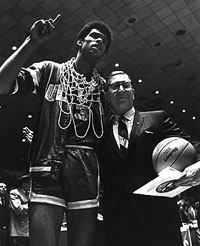 John Wooden and Lew Alcindor (Kareem Abdul-Jabbar)
John Wooden and Lew Alcindor (Kareem Abdul-Jabbar)
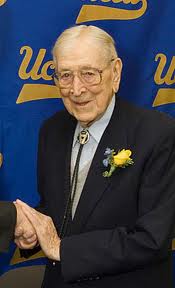
John Wooden in retirement
|
Baseball was always my first love. That's my favorite sport. But basketball, to me, is a greater spectator sport for a number of reasons. It's played with the largest object. The basketball is larger. The spectators are closer to the action. They can follow the ball. You can't always follow the baseball or the puck or the football, but you can follow the basketball. It's a fast game. It's a game of action. It has all the ingredients, I think, to make it a tremendous spectator sport. I think it is the best of all the spectator sports. It's a team game.
The speaker is John Wooden, legendary UCLA basketball coach. One of his greatest players, Kareem Abdul-Jabbar, reinforces what John said about baseball.
He also has a very good baseball mind. I don't know if you know this, but he was offered the opportunity to manage the Pittsburgh Pirates (in the 1960s). He declined because he was committed to his job at UCLA. But he's a serious baseball guy. We've had many good discussions about all-time teams. (Sporting News)
Wooden was involved with baseball as both a college player and a coach.
- At Purdue, Wooden won two letters in baseball as well as earning All-American honors as a guard on the basketball team from 1930-32.
- Wooden brags that he had a "great arm, not a good arm, a great arm." He played one summer with a couple of St. Louis Cardinals who told him he had a better arm than some big-league shortstops. However, a pitch that hit him in the right shoulder affected his throwing from then on.
- As a high school coach in Kentucky and Indiana, he coached baseball as well as basketball and other sports.
- After serving in World War II, he went to Indiana Teachers College (now Indiana State University) as athletic director, basketball and baseball coach for two seasons prior to moving to UCLA.
The offer to manage the Pirates came about this way.
- At a dinner in Los Angeles in the 1960s, Wooden sat next to Pirates' GM Joe Brown Jr. Brown discovered John was a baseball fan and talked baseball with him the entire evening.
- When the dinner ended, Joe asked Wooden if he would be interested in managing the Pirates.
- After verifying that Brown was serious, John told him that he couldn't do it. He had never played professionally and would get no respect from the players.
|
|
Get ready, America! You'll have to enjoy March Madness without Billy Packer!
Half of you are going, "Oh, no, what will I do?" The other half exclaim, "Thank, God!" No announcer in any sport since Howard Cosell has generated so much venom among critics.
Whatever your opinion of him, you haven't been seeing Packer on CBS this year and, after 34 years, he won't be the lead color analyst for March Madness. Clark Kellogg will join Jim Nance as CBS's featured broadcasting team. I'm in the "Thank, God!" group. Kellogg will be far better, in my opinion.
Here's some facts about Packer that you may not know.
- He was an outstanding high school basketball player in Western PA.
- Packer went to Wake Forest, where he led the Demon Deacons to their only Final Four appearance in 1962.
- He was briefly an assistant at his alma mater before launching a successful business career building shopping centers and golf courses (a strange combination).
- In 1972, he filled in on an ACC telecast with Jim Thacker. The next year, he was Thacker's regular partner.
- In 1975, he worked his first Final Four for NBC. In 1977, that network paired him with Al McGuire and play-by-play man Dick Enberg to form the most popular broadcasting team in college basketball history. Like Don Meredith with Howard Cosell, McGuire balanced Billy and injected a sense of fun in the broadcast.
- In recent years, Packer had a year-to-year contract with CBS. Last summer, the network announced it was replacing Billy with Kellogg.
- In November 2008, Packer was inducted into the National Collegiate Basketball Hall of Fame as a "contributor."
- Billy agrees that it was time and doesn't seem bitter. "I'm 68 years old, and I've got plenty left to do. I had a lot of fun."
- Packer has started a multimedia NCAA Tournament venture with Bob Knight as his partner – quite a pairing.
Reference: "You may miss Packer, but he's not looking back," John Feinstein,
Sporting News, 12/08/2008
|
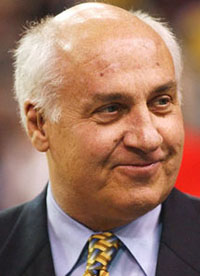
Billy Packer
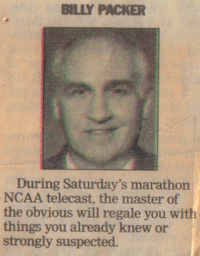
|
|
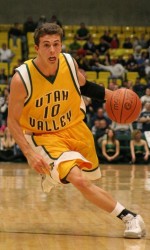
Ryan Toolson
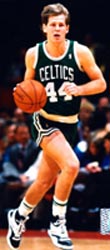
Danny Ainge
|
Ever hear of Utah Valley University? Ever hear of Ryan Toolson?
Toolson scored 63 points for UVU on January 29, 2009, in a four OT game at Chicago State. That tied for the tenth highest one-game point total in NCAA history.
It's understandable that you never heard about the feat. There was no TV, and none among the 1,000 or so spectators shot any video, not even with a camera phone. It was only a week later that the UVU athletic department received a DVD containing the highlights of Toolson's performance. CSU had filmed the game for scouting purposes and made the video.
Here's some more info about Toolson.
- The 6'4" senior is the nephew of Danny Ainge, a great scorer himself at BYU and now GM of the Celtics.
- UVU is in its seventh and final year of transition from junior college to Division I status. Next year, the Wolverines will play in the Great West Conference, which strangely includes New Jersey Institute of Technology, which just finished the 2008-9 season 1-30 after going 0-29 in 2007-8.
- Toolson's 24.3 ppg would rank seventh in the nation if his team were a full-fledged Division I member. His 93.4 FT% would be first. He's actually in a bit of a slump because his career FT% is 94.2. As a sophomore, he shot 97% from the line.
- The Arizona 5A Player of the Year his senior year at Gilbert HS, Toolson didn't get offers from major colleges, some of whom were leary of his intention to go on a Mormon mission after his freshman year. (He went to Guatemala.) Even his uncle's alma mater, BYU, wanted him to walk on.
- Toolson seemed destined to play in Europe before his 63pt outburst caught the attention of some scouts. Now he is expected to get some interest as a free agent from NBA teams.
- If Toolson makes an NBA roster, believe it or not he would be the UVU's second player in the league. Coach Dick Hunsaker, who also coached the other player, Ronnie Price of the Utah Jazz, says "Ronnie was a great player, but Ryan gets three times the attention from the D. He can play in the NBA, no doubt in my mind."
- Hunsaker points to a game last year when UVU led Marquette by two at the half. Toolson's 13 points caused Jerel McNeal, who had been Big East Defensive Player of the Year, to be assigned to someone else for the second half.
Reference: "A Shot in the Dark," Tim Keown, ESPN the Magazine, 3/09/09
|
|
Oklahoma's Blake Griffin is a strong favorite (some say a shoo-in) for national player of the year. After 30 games of the 2008-9 season, the sophomore C averages 22.1 points and 14.2 rebounds per game. He has 39 blocks and 37 steals. He shoots an astounding 63.4% on 2-point FGs.
Against Texas Tech on February 14, Blake did something no other Big 12 player – and very few players anywhere – has ever done. The 6'10" 250 lb C posted a 40-20 game (40 points, 23 rebounds). If he decides to enter the NBA draft this spring, he is expected to be picked no lower than #3.
Blake led Oklahoma Christian School in Oklahoma City to four straight state titles. Coached by his father, the school compiled a 106-6 record in his four years there. Tommy Griffin's practices all start with a half hour of fundamentals.
Blake credits his development as a basketball player in part to the fact that he grew up competing head to head with his older brother Taylor, who is a 6' 7" senior F for the Sooners who made second team All Big 12 for 2007-8. Also the family stressed the importance of a healthy diet. The boys went more than two years without a sip of soda. And the Griffins are fanatics about conditioning, especially stretching and weight training.
With Taylor already at OU, it was assumed that Blake would follow in his footsteps. However, before Blake's senior year of high school, coach Kelvin Sampson left for Indiana. So the new coach, Jeff Capel, made it his first priority to keep the McDonald's All American in the fold.
If Blake Griffin wins the player of the year award, he will join Sooner QB Sam Bradford as players of the year in their respective sports. Bradford, by the way, was a classmate of Blake's at Oklahoma Christian and, by all accounts, not a bad basketball player himself. If OU women's star Courtney Paris wins the national player of the year award in her sport, the Sooners will hold a monopoly on the major awards for the 2008-9 school year.
Reference: Sporting News, 03/02/2009
|
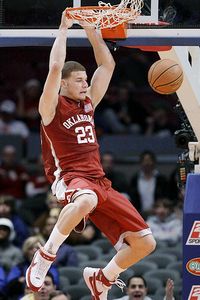
Blake Griffin
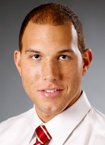
Taylor Griffin
|
|
From Jersey Courts to Hollywood
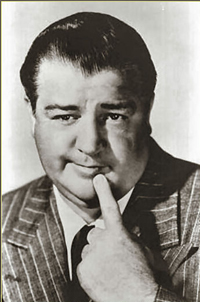
Louis Cristillo
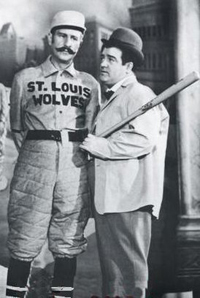
Abbott & Costello |
Louis Francis Cristillo was born in 1906 in Paterson NJ to an Italian immigrant father and an Irish-American mother. As a boy, his main interests were basketball, baseball, and movies.
Lou excelled in basketball.
- He earned an athletic scholarship to Cornwall-on-Hudson Military School.
- He once outplayed an opponent who became one of basketball's earliest pros, Nat Holman of the Original Celtics.
- He was once the New Jersey State Foul Shot champion.
Cristillo also boxed under the name "Lou King." He won eleven bouts and drew the twelfth until one night his father came to the arena to watch the fisticuffs and saw his son in the ring. Lou's boxing career thus ended abruptly.
Lou left high school without graduating and traveled to Hollywood where he got some work as a stunt man. Tired of working anonymously, Lou gave stage work a try and achieved some prominence by the mid-1930s as a burlesque comedian.
He finally got the break he was looking for when he became the straight man for Bud Abbott in 1936. Lou promoted the duo on radio and Braodway until he finally achieved his dream when they signed a movie contract in 1940.
In case you haven't guessed, Lou Cristillo is known to history as Lou Costello. He and Abbott are most well know for their famous "Who's on First?" routine.
|
|

Pete Maravich |
Basketball records that may never be broken.
- Pete Maravich's 44.2 ppg three-year career average at LSU which was accomplished before the 3-point line.
- Wilt Chamberlain's 27.2 rebounds-per-game in the 1960-1 NBA season with the Philadelphia Warriors. Wilt averaged at least 21.1 rpg his first twelve pro seasons and ended his career with a 22.9 average.
- Chamberlain's 50.4 ppg for the entire 1961-2 NBA season. That was the season Wilt threw in 100 vs the New York Knicks. The closest anyone has come is Kobe Bryant's 81 vs the Toronto Raptors in 2006. Go to the Most Points by One Player in One Game list and see how many times Wilt's name appears. There simply was no one in the league except Bill Russell who had any chance of stopping The Big Dipper.
|
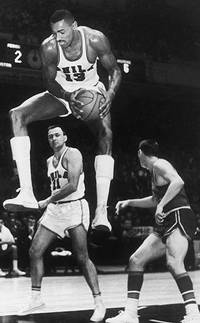 Wilt Chamberlain
Wilt Chamberlain |
|
Abe Saperstein founded the Harlem Globetrotters in 1926. Not one of the players hailed from Harlem. Most were from Chicago. And certainly none of them were world travelers. Saperstein thought the word "Harlem" meant entertainment and so chose the name to enhance marketing potential.
At first, the team played "real games," mostly in Illlinois and the midwest. Eventually, they began barnstorming across the country. One night in 1939, when the Trotters had amassed a 112-5 lead, they began goofing around, much to the delight of the crowd. Soon the antics became the keystone of their performance. Their popularity led them to finally live up to their nickname and circle the globe as basketball ambassadors.
|
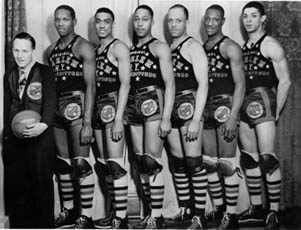
Abe Saperstein and his Globetrotters |
|
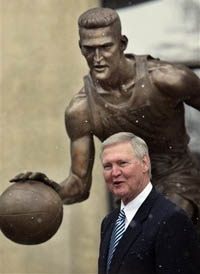
Jerry West in front of the statue of him at WVU |
6'3" Jonathan "Jonnie" West was a "sweet-shooting star" on his high school basketball team in Memphis where he was named All-State. Jonnie chose to play college ball at West Virginia. That decision put the young man squarely in the shadow of his father, Jerry West, the greatest player in West Virginia history. Jonnie had grown up in Memphis while his father was the GM of the Grizzlies.
Jonnie redshirted in 2006-7 and has played limited minutes the last two seasons for Bob Huggins. West suffered a setback when he broke a bone in his left foot in early December 2008. As a consequence, he played only 35 minutes in 11 games.
Jonnie on the challenge of following a legend: "A lot of people would initially think about me [that] I was intimidated by him or have that over my head, that he was this great player. As people get to know me, they realize I'm a different person. It would be hard to get even close to how good he was. That's one thing I've been able to do my whole life is separate myself from him. They just put a statute up [of Jerry West] two years ago. It's right at the entrance to the Coliseum, so I see it pretty much every day. Of course, it makes me proud to have someone in your family, let alone your father, be recognized by so many people and accomplish the things he did. It's a great feeling."
|
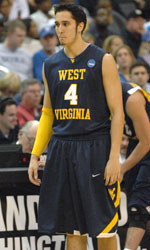
Jonnie West
|
Reference: "The Mountaineer," Sporting News 4/27/2009
|
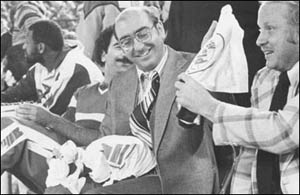
Dick Vitale, Pistons Coach |
Today Dick Vitale is totally associated with college basketball. And he did coach in college. What you may not know is that Dick coached in the NBA with the Detroit Pistons.
- Vitale coached the University of Detroit from 1973-77. The team made the 32-team NCAA tournament in his last year there. His record was 78-30, including a 21-game winning streak in 1977. He then became the AD for 1977-8.
- He coached the Pistons for the 1978-9 season, compiling a 30-52 record. Then, 12 games into the 1978-9 season, he was fired.
That firing may have been the best thing to ever happen to Dick. He was soon hired by a fledgling network named ESPN to do commentary on college basketball. Vitale called the network's first college game on December 5, 1979, a DePaul 90-77 victory over Wisconsin.
The rest is history, as they say. Dick is now a college basketball icon who is credited with helping the college game grow in popularity across the nation. In 2008, he was inducted into the Basketball Hall of Fame not as a coach but as a contributor to the game.
|
|
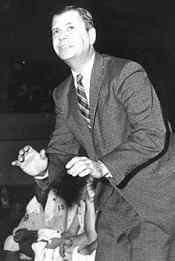
John Kundla
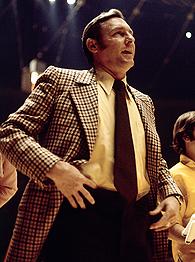
Bill Sharman
|
Since it began in Minneapolis in 1948-9, the Lakers franchise has missed the playoffs only five times in 60 years.
- 1957-8: Adapting to life without star C George Mikan, who retired after the 1955-6 season, the Minneapolis Lakers started 10-23, at which point John Kundla, the only coach the franchise had had, was fired in favor of Mikan. George wasn't the answer, as the team went 9-30 under him. Kundla resumed his post the next season and made the playoffs with rookie sensation Elgin Baylor despite a 33-39 record.
- The Los Angeles Lakers missed the playoffs two years in a row, 1974-5 and 1975-6, for the only time in franchise history. The team declined after the retirement of its trio of Hall of Famers: Elgin Baylor, Jerry West, and Wilt Chamberlain. The coach was the same Bill Sharman who had led the Lakers to the championship in 1971-2, but the talent wasn't there. West took over in 1976-7 and, greatly helped by the addition of Kareem Abdul-Jabbar, returned LA to the post-season.
- The 1993-4 Lakers won only 33 games to miss the postseason for the first time in 18 years. Magic Johnson, who had retired after the 1990-1 season because of AIDs, tried his hand at coaching late in the season to no avail. Del Harris produced a playoff team the following year.
- Shaquille O'Neal left for Miami and Phil Jackson retired after the 2003-4 season. Left with very little support, Kobe Bryant couldn't carry the Lakers in the playoffs after the 2004-5 season. Jackson returned the following year to resume another playoff run.
|
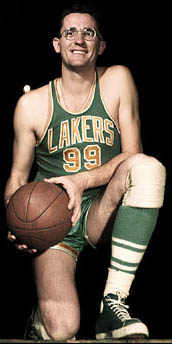
George Mikan
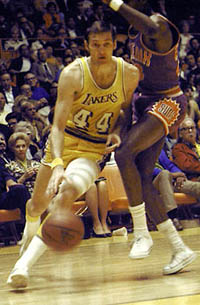 Jerry West Jerry West |
|
|